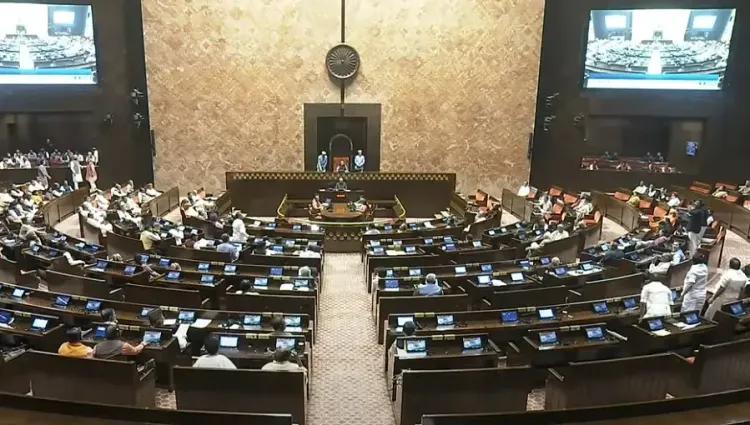Rajya Sabha Achieves 119% Productivity with Historic 17-Hour Session

Synopsis
Key Takeaways
- Rajya Sabha achieved 119% productivity.
- Longest sitting lasted 17 hours.
- Introduced 49 Private Members' Bills.
- Active participation from 73 and 89 Members in key discussions.
- Passed the Waqf (Amendment) Bill 2025.
New Delhi, April 4 (NationPress) The 267th session of the Rajya Sabha achieved an extraordinary productivity rate of 119 percent, marking a significant milestone in the parliamentary history of India.
Despite ongoing disruptions and disagreements between the ruling party and the opposition, the House established a new record for the longest sitting, convening from 11 a.m. on April 3 until 4:02 a.m. on April 4.
During this session, a total of 49 Private Members' Bills were introduced, highlighting the legislative activities undertaken. The House adjourned sine die on Friday.
In reflecting on the session, Rajya Sabha Chairman Jagdeep Dhankhar emphasized the importance of the debates. "The House engaged in a profound discussion on the Motion of Thanks to the President's Address, which lasted three days with the active involvement of 73 Members. Similarly, discussions regarding the Union Budget 2025-26 extended over three days, with contributions from 89 Members," he remarked.
The Rajya Sabha also engaged in substantial discussions on four crucial ministries, including the Ministry of Home Affairs, with Union Home Minister Amit Shah addressing the debate.
Chairman Dhankhar underscored the historic nature of the sitting on April 3-4, describing it as a defining moment in legislative history. "The Rajya Sabha has inscribed its name in history with an unparalleled 17-hour sitting. During this extended session, the House ratified the Waqf (Amendment) Bill 2025, a transformative legislation aimed at improving transparency and accountability in Waqf property management while modernizing legacy systems," he stated.
Overall, the House operated for a cumulative total of 159 hours, exceeding standard productivity expectations.
Chairman Dhankhar noted that this session was characterized not only by legislative accomplishments but also by engaging debates, sharp wit, humor, and cross-party collaboration, which reinforced democratic traditions. "The discussions were enriched with insightful contributions and varied opinions, maintaining parliamentary decorum and legislative rigor," he commented.
He further mentioned that this session represents a pivotal moment in India’s parliamentary history, showcasing how dialogue, perseverance, and a shared purpose can foster effective governance.
With its record-setting sitting and legislative successes, this session has established a new standard for parliamentary productivity and democratic participation, he concluded.










